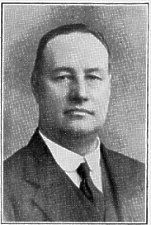
[From IoM Examiner Annual 1923]

was last month selected as Mayor of Douglas, after having served on the Town Council since 1911. He was elected to the House of Keys in 1921, to succeed Mr. R. B. Moore, now Attorney-General, and was made a J.P. later in the same year. He was born fifty years ago, in Blackpool, but his father, the late Mr. James Crookall, came to Douglas in 1887. For a number of years he combined the occupation of restaurant proprietor with that of painter and decorator, and during the war he was responsible for the daily feeding of same 25,000 prisoners and guards at the Knockaloe Alien Detention Camp.
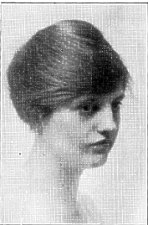
The duties of Mayoress are being discharged by his elder daughter, Miss Gertrude Crookall, the first unmarried lady to occupy that position in Douglas.
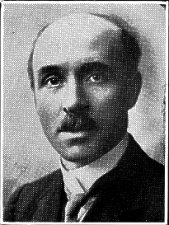
Mr. Ramsey Bignall Moore was appointed Attorney-General in February, 1921, in succession to Mr. G. A. Ring, resigned. He is 43 years old, and is the eldest son of the late Mr. James Moore, draper, of Douglas. After completing his education at the Douglas Secondary School, he was articled to Mr. Ring, and was admitted to the Bar in 1902. Subsequently he practised in partnership with Mr. Ring, and for the greater part of twenty years he was recognised as one of the outstanding figures in Manx legal circles. He first entered public life in 1908, when he was elected to the Douglas School Board, and he speedily became one of the most influential members of that body. In 1919, he was returned to the House of Keys, at a bye-election following upon the elevation of Mr. Joseph Cunningham to the Legislative Council. He is a member of the Council of Education, and chairman of the Old Age Pension and National Health Insurance Board, appointed mainly by Tynwald. He sees no reason why His Majesty's Attorney-General should be ashamed of conducting a Wesleyan Sunday-school week by week, presiding at Wesleyan public meetings, and serving on Wesleyan committees.
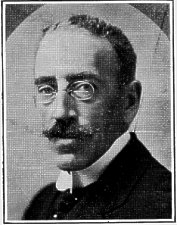
Just twelve months ago, Mr. William Lay was appointed High Bailiff of Ramsey and Peel, in succession to Mr. F. M. LaMothe, now Northern Deemster. Mr. Lay, who is a son of the late Mr. George Lay, of " Thornton," Douglas, was born in 1868, and after receiving his education at King William's College, was articled to Mr. W, F. Dickinson, advocate, of Douglas. He was admitted to the Manx Bar in 1891, and rapidly built up a valuable practice, which he now shares with his son, Mr. Howard D. Lay, and with Mr. Ramsey G. Johnson. He has frequently acted as revising advocate and returning-officer in the House of Keys' elections for North and South Douglas. He is intensely musical; for many years he assisted in the choirs which came from Onchan to compete in the Music Guild Festival, and he has served as chairman of the committee which organises that celebrated event. Several years ago he took up residence in " Rushen House," Castletown, but he proposes to discharge the social duties which appertain to the office of High-Bailiff, and is just about to move into a house at Ramsey.
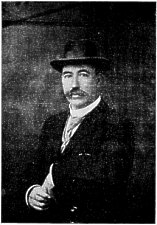
Mr. George Bruce Kermode was born 55 years ago, and is the son of the late Mr. Henry Kermode, of Glenfaba Mills, near Peel. In 1883 he came into Douglas to serve his apprenticeship as a cabinet maker with the late Mr. Corlett. A few years later, he set up on his own account in Peel, and he progressed until he had built and occupied premises which are among the handsomest in the Island. Far some years he farmed Shenvalla, Patrick, and he also engaged in the corn business, retiring into private life in 1918. He has been chairman of the Peel School Board and of the Western Higher Education Authority, and is now a member of the Council of Education: He contested the constituency of Peel with the late Mr. T. H. Cormode in 1913, and six years later he succeeded in commending himself to the electors of Glenfaba. His uncles, the late Mr. John Quayle (Glenmaye) and Mr. Wm. Quayle, have also been members of the Legislature. He is chairman of the Tree-Planting Board set up under the auspices of the Tynwald Court.
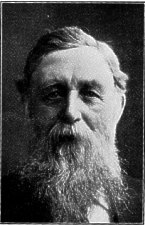
One of the most familiar figures in Douglas business circles for the past thirty years has been that of Mr. George William Morrison, who has just retired from the service of the I.O.M. Steam Packet Company. Mr. Morrison's principal duty was the collection of accounts, but it also came within his province to adjust those claims and disputes which must necessarily arise from time to time in connection with the business of a carrying company. He spent a considerable part of his youth in Dakota, U.S.A., where he held the position of superintendent of Stores on behalf of the military authority. He came to the Island in 1887, and became secretary of the company which then ran The Palace as a separate concern; and in 1891 he entered upon the employment which he has just relinquished on attaining his 83rd year. Despite his venerable appearance, he is brisk in deportment and jovial in manner, and his numerous friends confidently wish him many years yet of life and health,
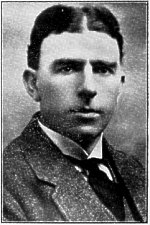
The first electrical engineer to the Borough of Douglas is to be Mr. Bertram Kelly, A,M.I.E,E., who is now acting as clerk of the works while the electricity system is being installed, and who will subsequently assume the management of the concern. Prior to this appointment, which was made in September last, Mr. Kelly was chief assistant engineer to the Manx Electric Railway Co., and he had previously held positions in connection with the electric lighting and traction undertakings of the Midland Railway, the London County Council, and the Hornsey Borough Council. He was born in Douglas, but 35 years ago his father, Captain James Kelly, left the Island to take up the management of the Southend on-Sea Pier, Pavilion, and Electric Tramways. He was educated at the Southend-on Sea High School and at Walton College, and studied electrical engineering at the Royal Technical Colleges Glasgow. Before returning to the Island he was one of the most active members of the London Manx Society.
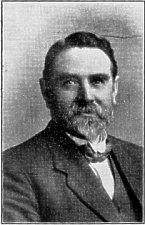
That bread is nowadays produced in large quantities by machinery, with consequent great increases in the rate of production, and in the leisure hours allowed to the workman, is due in no small measure to the inventions of a Manxman, Mr. John Callow, whose portrait appears above. Mr. Callow is a native of Laxey, and after some experience of his trade in Douglas, he went to Liverpool in 1883. Shortly afterwards he obtained a situation with the famous firm of Messrs: George Lunt, Sons, & Co., and two years later he introduced what is, known as the " straight dough" method, by means of which it became possible to abandon the process of fermenting and sponging which had been in operation for hundreds of years, and to perform in five hours what had previously occupied sixteen or eighteen. Mr. Callow's idea is now adopted all over the country, and one immediate result was that operatives were enabled to spend the whole Sunday clear of work. Years after, following upon repeated experiment. Mr. Callow was able to develop a process of automatic dough-dividing, and now, in factories, the output has been increased from one-and-a-half sacks per man per day to six sacks. He subsequently joined the well-known firm of Joseph Baker, Sons, & Perkins, Ltd., of Willesden Junction, London. Mr. Callow regularly visits his native Island, where he has numerous friends.
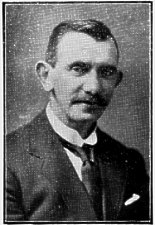
That the Castletown choirs have not hitherto achieved success in the outstanding competition in the Manx Music Guild Festival, namely, that for sixty-voice choral societies, is not due to any lack of industry or of musical genius on the part of their conductor, Mr. William Henry Cubbon. Mr. Cubbon is full of music from the crown of the head to the sole of the foot, and he is withal modest, single-minded, and capable of inspiring affection and respect. He is organist and choirmaster at the Castletown Primitive Methodist Church, with which all the members of his family are actively associated, and recently he accepted the conductorship of the Metropolitan Brass Band, whose performances are once more affording intense pleasure, Mr. Cubbon is also well-known and popular in Port Erin, where he conducts a branch of the business of Henry Cubbon & Sons, butchers.
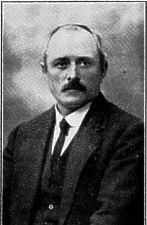
Mr. William Moore, the junior member of the House of Keys for Rushen, is just 52 years old, and has for a number of years farmed Balladoole, a mile or so out of Castletown. An earlier essay as a tenant farmer was made in the neighbouring estate of Scarlett, and the family to which Mr Moore belongs have occupied Ballacross, in Arbory, for a great many generations. Mr. Moore has interested himself in all the local farmers' organisations; he has been chairman of the Farmers' Club, of the Southern branch of the Farmers' Union, and the very flourishing Southern District Agricultural Society, and in the Legislature he is recognised as a very levelheaded, fair-minded spokesman of agriculture At the same time, he has managed to earn the goodwill of organised labour, and his general policy is impartial and distinctly progressive. He has taken an active part in the public affairs of Arbory parish, and is an ex-chairman of the now defunct Southern Higher Education Authority; and that the lighter side of life has attractions for him is shown by his interest in the Castletown Football Club and the Castletown Choral Society. Among other offices which he holds is that of trustee of the Castletown Tent of Rechabites. He received his mandate as a legislator in December, 1919, after having come within eight votes of success in the General Election a few weeks previously, He is a member of the Board of Agriculture and of the Highway Board.
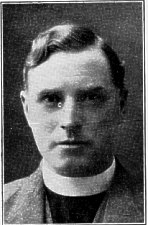
The Rev. S. Paul Hadley came to the Island last September, as junior minister of the Douglas Wesleyan circuit. He is a native of Wednesfield, South Staffordshire, and entered the ministry in 1908, after thirteen years' service in the locomotive department of the Great Western Railway: He volunteered for pioneer missionary work in Lagos, West Africa., and laboured in that field for eighteen months, returning to undergo his training at the Didsbury Theological College. He is a "young people's man," and has had official charge of reformatory schools and working lads' institutes. He is a doughty figure in football, golf, and tennis, and his feats of pedestrianism have already begun to amaze his Manx acquaintainces. He is a recognised football referee, and has already officiated at Insular matches.
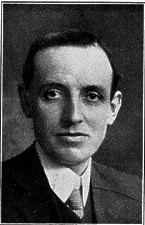
No opinion carries more weight in Ramsey than that of Mr. John Baxter Clague, whose portrait appears above. Mr. Clague's capacities for public service in any direction are exceptionally high, but education is his hobby. He has been secretary to the managers of the defunct Ramsey Wesleyan Day School, chairman of the Ramsey School Board, chairman of the Finance Committee of the Northern Higher Education Authority, and he is now chairman of the Governors of the newly-established secondary school at Ramsey, and an influential member of the Central Education Authority, In lucidity and calmness of speech, in sobriety of judgment, and in rectitude of character he is scarcely inferior to his intimate friend the late Mr. W. T. Crennell, H.K., whose. political principles he shares. Mr. Clague is still on the right side of fifty, and carries on the business of ironfounder established by his late grandfather and continued by his late father. He is a popular local preacher, and has held practically all the offices open to a Wesleyan Methodist layman, among them being that of local treasurer and secretary of the National Children's Home and Orphanage, which has two branches in Ramsey. He is chairman of the Ramsey Waterworks Company.
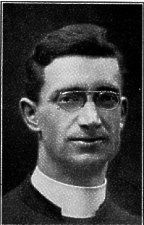
The Rev. W. H. Willetts, M.A., was on November 22nd last inducted and collated to the vicariate of German, rendered vacant by the !esignation of the Rev. W. Newton Hudson, now of Ashton-on-Ribble, near Preston. Mr. Willett was educated at the University of Durham, and was ordained deacon by the Bishop of Durham in 1911, taking priest's orders the following year. He took the degrees of L.Th. in 1911, B.A. in 1913, and M.A. in 1916. After holding curacies in Gateshead and Widnes, he became Vicar of St. Catherine's, Edge Hill, Liverpool, in 1917. He has frequently visited the Isle of Man in order to preach at Sunday-school anniversaries and similar special services, and is well known in Douglas as a thoughtful and convincing preacher. He is also reputed to possess considerable organising capacity.
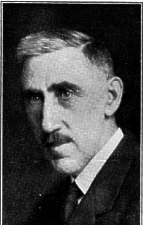
Mr. Frank Gill, who on November 2nd last assumed the presidency of the Institute of Electrical Engineers, was born in 1866 at Castletown, and is a son of the late Mr Henry C. Gill, advocate, and a nephew of the late Archdeacon Gill. His mother was a daughter of Mr. William Claxton, of Liverpool. He received his, early education in the Isle of Man and Southport; he then joined engineering evening classes at Finsbury, London, and also studied at the Royal College of Science, Dublin, and at the Liverpool University. In 1882 he entered the service of the United Telephone Company, London, and after holding responsible positions in Liverpool, Blackburn, and Dublin, he became engineer-in-chief to the National Telephone Company, a post which he held from 1902 to 1913. When war broke out, he placed his technical knowledge at the disposal of his country, and in April, 1919, he obtained the rank of Controller of the Central Stores Department of the Ministry of Munitions. In this capacity he had charge of 22,000 persons, working at 300 depots, and the expenditure was at the rate of £2,000,000 per annum. The department worked strictly to costs all through. Later in the same year he became European Chief Engineer to the International Western Electric Company. He has various electrical inventions to his credit, is a member of the British Engineering Standards Committee, and has studied telephone matters at first hand in almost every country in both hemispheres. His wife is a daughter of the late Mr. C. W. Beckwith, advocate, of Douglas.
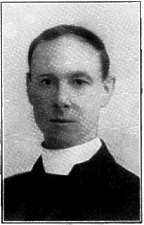
who was on November 29th inducted and collated Vicar of Michael, is a graduate of St. John's College, Durham. He has been in Nigeria since shortly after his ordination in 1909, working among one of the Yoruba tribes. In 13 years he saw the Christian population of his district grow from 500 to 14,000, and the number of churches from 10 to 174. He has suffered from sun, and from Blackwater Fever, and the Medical Board of the C.M.S. declined to sanction his return to Nigeria. He is keen on athletics, and has been in his time a racing cyclist. an oarsman. and a shot putter, and hopes on a pitch he may be able to help the Michael football club, who have signed him on as a goal keeper.
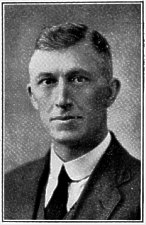
One of the discoveries of the new House of Keys is Mr. Joseph Davidson Qualtrough, the representative of Castletown. Strictly speaking, Mr. Qualtrough was an old member at the time of the Dissolution in November, 1919, since three months earlier he had been the victor of a bye-election caused by the death of the late Colonel Moore. His opponent on that occasion was Mr. James R. Corrin, now the senior member for Rushen. He received this new honour the day following his official discharge from the Army, in which he had served since January, 1915. Mr. Qualtrough is 37 years of age, and is the eldest son of Mr. Joseph Qualtrough, the present Receiver General. He was educated at King William's College, where he was head of the school, and he subsequently joined his father and brother in the business of timber merchants at Castletown. He is a member of the Council of Education, and a trustee of his old school, and he also holds seats on the Advertising Board and the Finance Committee of the House of Keys. He is a Wesleyan local preacher, and holder of numerous offices in the Wesleyan connexion, including that of representative to the Conference of 1923.
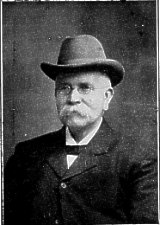
an ex-president of the Barrow Manx Society, is a son of the late Mr. James Cleator, shoemaker, of Andreas, and came to Barrow in 1863. He has erected numerous handsome public buildings in Barrow and Millom. He is an ex-chairman of the Barrow Board of Guardians, chairman of the Barrow Old Age Pensions Committee, and an influential Methodist. He is 83 years old.
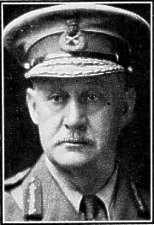
Major-General Lionel Charles Dunsterville, C.B., C.S.I., who has resided in Port Sc. Mary since 1919, and is a Justice of the Peace for the Isle of Man, may be justly described as a soldier of eminence. He was born in 1865, and was educated at the United Service's College, Westward Ho, North Devon, where he was the contemporary of Mr. Rudyard Kipling. He is popularly believed to have been the original of the hero in Kipling's celebrated story, "Stalky & Co." He entered the Royal Sussex Regiment in 1884, and transferred to the Indian Army in 1887. His military career lasted for 32 years longer. One of the romances of the great World War centres round the experiences of the mission commanded by General Dunsterville, which operated in Persia, and later at Baku, on the Caspian Sea. The stories told by the general of how, with twelve men, he managed to bluff an army, or how he found himself obliged to co-operate with Russian ship's crews who resolved themselves into committee in presence of the enemy, are enthrallingly interesting, and they have been told, in simple, modest style, both to casual Manx audiences, and to Great Britain's most famous learned-societies.
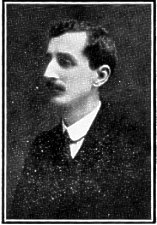
.Mr. Thomas Baker Cowley, of Ramsey, was on November 29th elected chairman of the Isle of Man Education Authority, succeeding Mr. Joseph Phillips, who held that office for the first two years of the Authority's existance. Mr. Cowley is 38 year's old, and is a son of the late. Mr. Robert Cowley, member of the House of Keys for Ayre. His uncle, Mr. Thomas Cowley, was at one time a prominent figure in Ramsey public life,, and his brother, Mr. W. Percy Cowley, a brilliant young advocate, is an ex-chairman of the Ramsey Town Commissioners. Mr. T. B. Cowley was educated at the Ramsey Grammar School, and then went into his father's business of corn and timber merchant. The business has been amalgamated with that of Messrs. T. Corlett & Sons, corn merchant's, of Douglas and Ramsey, and Mr. Cowley is a director of the joint concern. Mr. Cowley was initiated into public life in 1914, when he became a member of the Ramsey School Board. He has shown himself a forceful and polished speaker, and a man of conspicuous administrative capacity He is a local preacher, and Sunday school superintendent, and holder of various offices in the Wesleyan connexion.
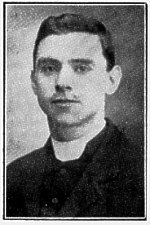
The new second minister of the Douglas Wesleyan circuit, who in practice exercises a special pastoral oversight over the Victoria-street Church, is the Rev. C. H. Brown, who comes from Crewe. Mr. Brown is a native of Liverpool, and has laboured in the South-West London Mission, and at Holyhead, Birmingham, the Potteries, and, as already stated, at Crewe. He is keenly interested in work among the young people, and the two causes of Foreign Missions and Methodist Union appeal to him strongly.
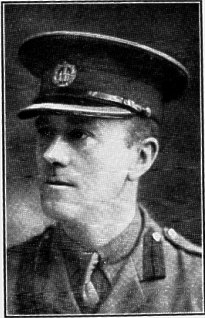
who is in charge of the new branch of Barclay's Bank Ltd., which was opened in Douglas last May, was formerly at Westcliffe-on-Sea as manager for Barclays. Still only a. comparatively young man, Mr. Swann served both in the Boer War in 1900-01 and in the more serious struggle of recent memory. In the Great War he was commissioned to the Essex Regiment (T.F.), and was subsequently appointed to the General Staff of the Southern Command as chemical adviser. In this capacity he had charge of several Gas schools, and was responsible for the training in Anti-Gas measures of all the troops in the command, over a quarter of a million men passing through the schools under his supervision. He was gazetted out of the Army with the rank of Major, and was awarded the O.B.E. in recognition of his military service;
|
|
||
| |
||
|
|
||
|
Any comments, errors or omissions gratefully received
The Editor HTML Transcription © F.Coakley , 2003 |
||